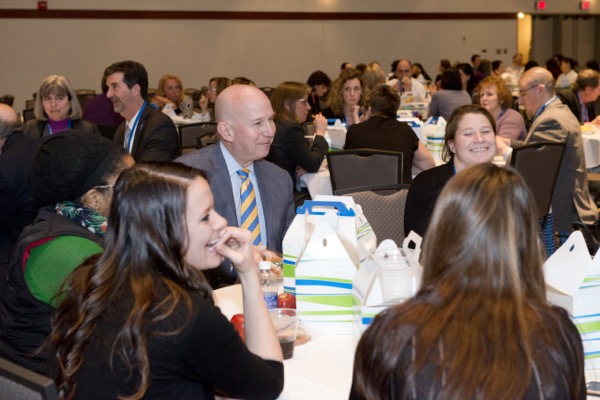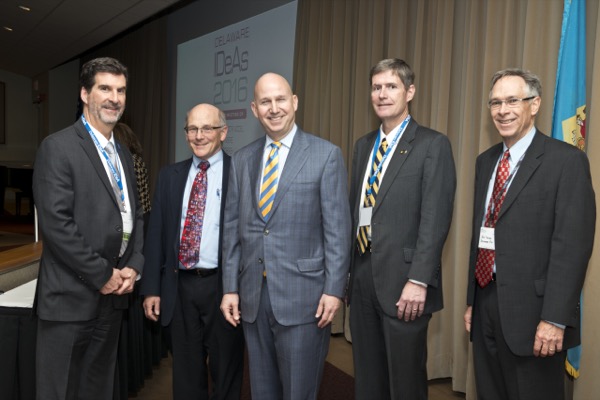Biomedical research
Delaware IDeAs meeting promotes biomedical research collaboration
8:04 a.m., March 11, 2016--University of Delaware senior Jessica Ade expected to grab a quick lunch with her colleagues from Christiana Care Health System’s Family Medicine Department before listening to the keynote address of the Delaware IDeAs 2016 symposium.
That was until Gov. Jack Markell sat down next to Ade – an intern in the department – while on a lunch break during his tour of the symposium at Clayton Hall. Between bites of his sandwich, Markell asked the staff about some of the health issues they confront while doing outreach among Delaware residents.
Research Stories
Chronic wounds
Prof. Heck's legacy
The group talked about teen pregnancy, infant mortality and the ways a woman’s health before she gets pregnant can affect her odds of a healthy delivery. It was a brief – but powerful – example of how biomedical research is impacting health in Delaware.
“People don’t usually understand the kind of work we’re doing,” said Carla Aponte, coordinator of the Health Ambassador program, which works to promote pre-pregnancy health in women and improve birth outcomes in Wilmington. “He talked. He asked questions. He listened.”
That was the goal of the inaugural Delaware IDeAs 2016 meeting – to spread the message about biomedical research and find more ways to collaborate on basic, clinical and translational research opportunities across the region.
It was organized by the Delaware CTR ACCEL, Delaware INBRE, the state’s seven COBRE programs and Delaware Bio.
“The idea is to get people talking and see what everyone is doing and see what facilities are available,” said Dr. Julia Barthold, associate chief in the Division of Urology at Nemours/Alfred I. duPont Hospital for Children and Nemours co-principal investigator for the Delaware CTR ACCEL. “One thing we want is for these researchers to get in conversations and realize the potential synergy.”
More than 300 researchers from academia, medicine and industry, along with students and others, came out for the workshops, poster sessions and networking opportunities. Poster presenters took turns describing their research and answering questions from an engaged audience.
More than two dozen people from the Medical College of South Carolina – a partner in the Delaware CTR – and half a dozen colleagues from CTR programs around the country also were among the conference attendees, said Stuart Binder-Macleod, principal investigator and program director of the Delaware CTR ACCEL program and Edward L. Ratledge Professor of Physical Therapy at UD. Several from the South Carolina contingent also presented.
“Just the level of interaction and enthusiasm was really heartwarming,” Binder-Macleod said. “It reinforced what we already know – Delaware is a great place to be doing biomedical research. We have great individuals here, and the spirit of cooperation was clearly evidenced at this meeting.”
Dr. Krishna White, an adolescent medicine physician at Nemours, was one of the poster presenters. She received an ACCEL Community Engaged Research (ACE) award this year from Delaware CTR ACCEL and is looking at understanding parents’ knowledge and attitudes about long-acting reversible contraception, such as the birth control implant.
White admits it’s a challenge to integrate research given the demands of her practice and the population she serves, but it’s worth it. Presenting at the IDeAs meeting gave her additional connections for finding families who may participate in her study. “This is helping my clinical practice,” she said.
CTR ACCEL, Delaware INBRE and the COBREs are funded through the National Institutes of Health Institute Development Award program, or IDeA, which supports faculty development and research infrastructure improvements in the 23 states and Puerto Rico that have historically received lower levels of funding.
The IDeA programs are focused on expanding Delaware’s biomedical research capabilities, enhancing diversity, addressing state-specific health diseases and creating an economic impact.
“We love this industry. Anything that contributes to saving lives and improving lives and adds high-paying jobs, that’s a win-win,” Markell said. “What we have in Delaware is the potential to come together – institutions, state government, higher education, hospitals, health care – and roll up our sleeves and figure it all out. The question is whether we will make it happen.”
Steven J. Stanhope, principal investigator of the Delaware INBRE program and professor of mechanical engineering and kinesiology and applied physiology, said work is already beginning to plan for next year’s IDeA meeting. “We want to make this bigger and even more impactful in showing how we are making the most of the NIH funding,” Stanhope said.
Charles G. Riordan, deputy provost for research and scholarship at UD, told the audience that the Delaware IDeA program, with its unique capabilities, has the potential to address challenges beyond the First State.
“We can change the future of health care,” he said.
Article by Kelly Bothum
Photos by Lane McLaughlin












